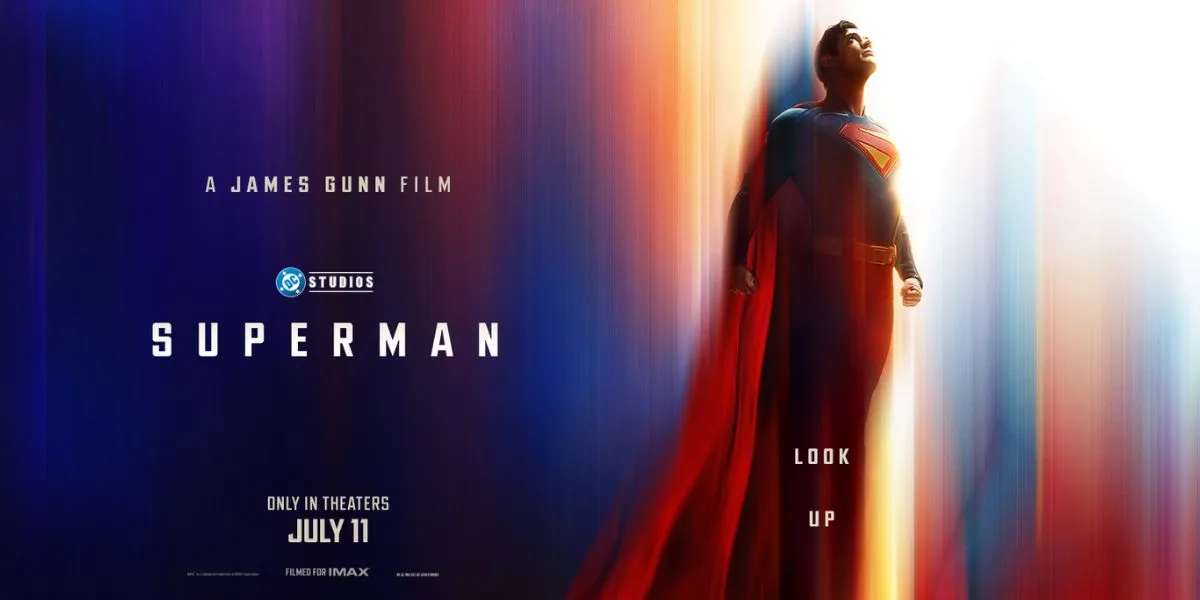James Gunn’s Superman (2025) has arrived with a mission: to redefine one of the most adored figures in comic book history and, in doing so, to reinvigorate a cinematic universe that had lost much of its charm. When Superman arrived in cinemas in July 2025, it was more than just another superhero film. Marketed as the official launch of the DC Extended Universe (DCEU), it posed as a character reboot and a franchise cornerstone, where the film faced immense pressure to succeed. Upon release, the film earned immediate commercial success, accumulating $217 million on its opening weekend, becoming the biggest solo Superman movie opening.
Instead of revisiting the familiar beats of his childhood or his initial discovery of powers, the film begins three years into being a meta-human superhero, ally to the Justice Gang. Where after thirteen previous Superman films, audiences no longer need another origin story. Gunn introduces Clark Kent to the audience as Superman, grappling with the challenges of balancing his two identities, alongside the scrutiny of various political leaders and the public. A deliberate departure from past iterations.
Superman (2025) can be seen distinguishing his film from its predecessor, Zack Snyder’s Man of Steel (2013). In which, Snyder’s envisioned Superman portrays a brooding, “god” against men struggling to reconcile his power alongside morals. However, Gunn’s interpretation presents a tone of optimism and moral clarity. David Corenswet embodies the Superman fans have grown up with selflessness, approachability, and a commitment to the double life of superhero and journalist. Gunn’s writing not only aligns with source material but also contrasts the nature of Superman’s dual identity. Through presenting Clark Kent as a comic accurate, awkward and clumsy individual, he highlights the implausibility of others recognising his alter ego, reinforcing the stark polarity between Superman’s composed and heroic presence, we had yet to see in Man of Steel.
A particular strength can be seen within Superman’s interactions with ordinary citizens and animals. Clark is embraced as a friend who lends a hand in times of need, stopping to help all, from squirrels to robots. Proving Superman’s greatest strength is not his invincibility but his compassion.
Much too often in the superhero genre, audiences are told how “evil” the antagonists are, rather than allowing the audience to come to the decision on their own, reducing their villains to caricatures. However, within Superman, Nicholas Hoult’s Lex Luther is not merely described as heinous, but rather we are able to witness his manipulative schemes unfold in real time, demonstrating how the villain is morally bankrupt. Where his intellect and ambition establish him as an interesting and complimentary adversary.
Talk about a breath of fresh air! Rachel Brosnahan’s Lois Lane presents herself as a distinctive and dimensional character, equally aiding the narration alongside Superman, shedding the role of damsel in distress love interest, no longer weak nor quiet. This Lois is grounded in wit, resilience, and a palpable chemistry, with romantic banter that recalls the eccentric essence of the couple’s dynamic that had been lost and fallen flat within the prior film.
Visually, Superman contrasts against the muted palettes present within the DCU. Gunn embraces colour and vibrancy that reflects the film’s optimism and the palette traditional to superman. Now some may find this bordering on childish, however I believe the stylistic choice perfectly aligns with the core ideology. Superman was never meant to embody despair but to inspire “kindness in a world that thinks kindness is old-fashioned”, reclaiming the hero’s significance as a beacon of hope, particularly at a time when much of the superhero genre feels weighed down by cynicism.

However, positives aside I do not believe Superman (2025) is not without flaws. Within the film there were certain plot points that felt underdeveloped or left unresolved. As seen in the “true” translation of Clark’s biological parents message sparks widespread uproar and questioning of his very existence, yet this thread is never revisited, leaving its significance frustratingly unclear. Similarly, some sequences lack real consequences, Superman’s AI robots miraculously return after being destroyed, and the world’s sudden shift back to supporting him feels overly convenient. But particularly, for a film marketed as the transition into Gunn’s new DC Extended Universe, the world-building feels surprisingly shortcoming. Although character cameos may excite longtime DC fans familiar with Gunn’s past projects, the underdevelopment of the characters may cause DC newcomers to become confused or excluded from the larger narrative.
It is safe to say that these weaknesses ultimately underscore what makes the film a brilliant watch. This film is a reclamation of a legacy, where Gunn’s Superman was not reinvented, but rather restored with the essence that once belonged to the hero, unapologetically aspirational, who values his humanity just as much as his Kryptonian heritage. His optimism is a constant throughout the film, seen in his handling of conflicts, the audience is able to resonate with the symbolic, and even political undertones of the narrative, a mirror of our real-world anxieties about fear, mistrust, and the abuse of power, inviting us to consider the choices we make, striving to do the right thing. This arc embodies a half full glass perspective, reminding audiences that kindness is punk rock.
For those tired of sombre superhero films, give Superman (2025) a chance!
★★★★☆
